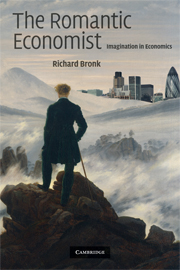Book contents
- Frontmatter
- Dedication
- Epigraph
- Contents
- Preface
- Acknowledgements
- 1 Preface to The Romantic Economist
- PART I THE PRELUDE: THE ROMANTIC ECONOMIST AND THE HISTORY OF IDEAS
- PART II Fragments of Unity: Romantic Economics in Practice
- 5 Using organic metaphors in economics
- 6 Economics and the nation state
- 7 Incommensurable values
- 8 Imagination and creativity in markets
- 9 Homo romanticus and other homines
- 10 Imagination and perspective in economics
- 11 The Romantic Economist: conclusion
- Notes
- Bibliography
- Index
10 - Imagination and perspective in economics
Published online by Cambridge University Press: 05 March 2015
- Frontmatter
- Dedication
- Epigraph
- Contents
- Preface
- Acknowledgements
- 1 Preface to The Romantic Economist
- PART I THE PRELUDE: THE ROMANTIC ECONOMIST AND THE HISTORY OF IDEAS
- PART II Fragments of Unity: Romantic Economics in Practice
- 5 Using organic metaphors in economics
- 6 Economics and the nation state
- 7 Incommensurable values
- 8 Imagination and creativity in markets
- 9 Homo romanticus and other homines
- 10 Imagination and perspective in economics
- 11 The Romantic Economist: conclusion
- Notes
- Bibliography
- Index
Summary
Chapters 8 and 9 have examined the crucial part played by the imagination in guiding the behaviour of economic agents, and the significance of creativity for the dynamic structure of markets and economies. This chapter, by contrast, explores the role of imagination in economic analysis itself. Standard economics textbooks rightly emphasise the importance of mathematical modelling and statistical empirical research techniques, but generally give little attention to a number of equally vital roles for the imagination in analytical endeavour. These include imaginative empathy with the human subjects of study and their historically contingent and culture-specific modes of thinking; the creative formation of new systems of thought and new metaphors that can restructure our vision and understanding; the imaginative use of different perspectives and metaphors side-by-side to improve our reading of the multifaceted nature of reality; and an imaginative openness to both unexpected anomalies and the possibility of non-standard readings of reality. To understand why economists need to concern themselves with this sort of analytical imagination and conceptual creativity, it is helpful to focus first on the implications of Romantic theories about the impossibility of objective and unmediated empirical knowledge, and to re-examine, in particular, the role of imagination and language in structuring the world-as-it-appears- to-us.
AFTER KANT: A DISCONCERTING OR LIBERATING PHILOSOPHY?
The Romantics inherited a recently transformed epistemological landscape. Hume had shown the impossibility of inferring the truth of general explanatory laws governing reality from the sense impressions that impinge upon us.
- Type
- Chapter
- Information
- The Romantic EconomistImagination in Economics, pp. 256 - 287Publisher: Cambridge University PressPrint publication year: 2009

